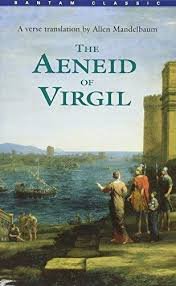-
Aeneid of Virgil, The
Virgil
Paperback (Anchor, Oct. 15, 1953)An extensive glossary identifying the numerous historical and mythical allusions accompanies this verse translation of Virgil's spic story of the journey of Aeneas from the ruins of Troy to Italy, where he becomes the ultimate founder of the great city of Rome. Reissue.
-
The Eclogues
Virgil,
eBook (Laurus Book Society, Dec. 29, 2019)The Eclogues, also called the Bucolics, is the first of the three major works of the Latin poet Virgil.Virgil was regarded by the Romans as their greatest poet, an estimation that subsequent generations have upheld. His fame rests chiefly upon the Aeneid, which tells the story of Rome’s legendary founder and proclaims the Roman mission to civilize the world under divine guidance. His reputation as a poet endures not only for the music and diction of his verse and for his skill in constructing an intricate work on the grand scale but also because he embodied in his poetry aspects of experience and behaviour of permanent significance.Virgil was born of peasant stock, and his love of the Italian countryside and of the people who cultivated it colours all his poetry. He was educated at Cremona, at Milan, and finally at Rome, acquiring a thorough knowledge of Greek and Roman authors, especially of the poets, and receiving a detailed training in rhetoric and philosophy. It is known that one of his teachers was the Epicurean Siro, and the Epicurean philosophy is substantially reflected in his early poetry but gradually gives way to attitudes more akin to Stoicism.During Virgil’s youth, as the Roman Republic neared its end, the political and military situation in Italy was confused and often calamitous. The civil war between Marius and Sulla had been succeeded by conflict between Pompey and Julius Caesar for supreme power. When Virgil was 20, Caesar with his armies swooped south from Gaul, crossed the Rubicon, and began the series of civil wars that were not to end until Augustus’ victory at Actium in 31 bce. Hatred and fear of civil war is powerfully expressed by both Virgil and his contemporary Horace. The key to a proper understanding of the Augustan Age and its poets lies, indeed, in a proper understanding of the turmoil that had preceded the Augustan peace.
-
The Aeneid: By Virgil : Illustrated
Virgil
eBook (GIANLUCA, Oct. 30, 2017)About The Aeneid by VirgilHow is this book unique?E-reader & tablet formatted, Font Adjustments100% Original contentUnabridged EditionAuthor Biography InsideIllustrations includedThe Aeneid is a Latin epic poem, written by Virgil between 29 and 19 BC, that tells the legendary story of Aeneas, a Trojan who travelled to Italy, where he became the ancestor of the Romans. It comprises 9,896 lines in dactylic hexameter. The first six of the poem's twelve books tell the story of Aeneas's wanderings from Troy to Italy, and the poem's second half tells of the Trojans' ultimately victorious war upon the Latins, under whose name Aeneas and his Trojan followers are destined to be subsumed. The hero Aeneas was already known to Greco-Roman legend and myth, having been a character in the Iliad, composed in the 8th century BC. Virgil took the disconnected tales of Aeneas's wanderings, his vague association with the foundation of Rome and a personage of no fixed characteristics other than a scrupulous pietas, and fashioned this into a compelling founding myth or national epic that at once tied Rome to the legends of Troy, explained the Punic wars, glorified traditional Roman virtues and legitimized the Julio-Claudian dynasty as descendants of the founders, heroes and gods of Rome and Troy.
-
The Aeneid
Virgil
Mass Market Paperback (Simon & Schuster, July 21, 2009)ENDURING LITERATURE ILLUMINATED BY PRACTICAL SCHOLARSHIP Virgil's sweeping epic of Trojan warrior Aeneas and the founding of Rome -- a stirring tale of exile, heroism, and combat, and of a man caught between love, duty, and fate. THIS ENRICHED CLASSIC THIS ENRICHED CLASSIC EDITION INCLUDES: A concise introduction that gives the reader important background information A chronology of the author's life and work A timeline of significant events that provides the book's historical context An outline of key themes and plot points to guide the reader's own interpretations Detailed explanatory notes Critical analysis and modern perspectives on the work Discussion questions to promote lively classroom and book group interaction A list of recommended related books and films to broaden the reader's experience Enriched Classics offer readers affordable editions of great works of literature enhanced by helpful notes and insightful commentary. The scholarship provided in Enriched Classics enables readers to appreciate, understand, and enjoy the world's finest books to their full potential.
-
The Aeneid
Virgil
Hardcover (Wilder Publications, March 27, 2007)Follow Aeneid as he flees a burning Troy with his family and sets out on a dangerous journey to found what will one day become The Roman Empire. Thrill with him as he gets caught up in conflicts between the gods, all the while striving to complete his own grand destiny. Virgil intended this book to be a sequel to the Iliad and the Odyssey, and as such it takes up with events just after the finish of the Odyssey. Inscribed here are myths and legends and tales of bravery destined to last for all time.
-
The Aeneid
Virgil
Mass Market Paperback (Penguin Books, Jan. 1, 1956)None
-
The Eclogues
Virgil
eBook (Interactive Media, June 15, 2014)This Virgil's book contains ten pieces, each called an eclogue, populated by and large with herdsmen imagined conversing and singing in largely rural settings, whether suffering or embracing revolutionary change or happy or unhappy love. Performed with great success on the Roman stage, they feature a mix of visionary politics and eroticism that made Virgil a celebrity, legendary in his own lifetime.
-
The Aeneid: By Virgil - Illustrated
Virgil
eBook (GIANLUCA, Aug. 1, 2017)How is this book unique?Font adjustments & biography includedUnabridged (100% Original content)IllustratedAbout The Aeneid by VirgilThe Aeneid is a Latin epic poem, written by Virgil between 29 and 19 BC, that tells the legendary story of Aeneas, a Trojan who travelled to Italy, where he became the ancestor of the Romans. It comprises 9,896 lines in dactylic hexameter. The first six of the poem's twelve books tell the story of Aeneas's wanderings from Troy to Italy, and the poem's second half tells of the Trojans' ultimately victorious war upon the Latins, under whose name Aeneas and his Trojan followers are destined to be subsumed. The hero Aeneas was already known to Greco-Roman legend and myth, having been a character in the Iliad, composed in the 8th century BC. Virgil took the disconnected tales of Aeneas's wanderings, his vague association with the foundation of Rome and a personage of no fixed characteristics other than a scrupulous pietas, and fashioned this into a compelling founding myth or national epic that at once tied Rome to the legends of Troy, explained the Punic wars, glorified traditional Roman virtues and legitimized the Julio-Claudian dynasty as descendants of the founders, heroes and gods of Rome and Troy.
-
The Aeneid
Virgil
Hardcover (Borders, Jan. 1, 2004)After Augustus was estabished as emperor of Rome following the battle of Actium (31 B.C.), the wealthy literary patron Maecenas urged the leading poets of the city to write an epic celebrating Augustus's triumph. Horace and Propertius declined; Virgil took up the challenge. He spent the last ten years of his life working on the AENEID, the Trojan hero who fled the burning ruins of Troy with his father Anchises on his back, to Latium, in Italy where he became, ultimately, the founder of Rome. The poem is modeled on Homer's epics in both its verse form (dactylic hexameters) and organization. From its immortal opening words, "Arma virumque cano" ("I sing of arms and the man"), to famous scenes such as Aeneas's long visit to the underworld (where Augustus's reign is foretold), the AENEID has held a primary place in Western literature for two thousand years.
-
The Aeneid: By Virgil : Illustrated
Virgil
eBook (GIANLUCA, Nov. 15, 2016)About The Aeneid by VirgilHow is this book unique?E-reader & tablet formatted, Font Adjustments100% Original contentUnabridged EditionAuthor Biography InsideIllustrations includedThe Aeneid is a Latin epic poem, written by Virgil between 29 and 19 BC, that tells the legendary story of Aeneas, a Trojan who travelled to Italy, where he became the ancestor of the Romans. It comprises 9,896 lines in dactylic hexameter. The first six of the poem's twelve books tell the story of Aeneas's wanderings from Troy to Italy, and the poem's second half tells of the Trojans' ultimately victorious war upon the Latins, under whose name Aeneas and his Trojan followers are destined to be subsumed. The hero Aeneas was already known to Greco-Roman legend and myth, having been a character in the Iliad, composed in the 8th century BC. Virgil took the disconnected tales of Aeneas's wanderings, his vague association with the foundation of Rome and a personage of no fixed characteristics other than a scrupulous pietas, and fashioned this into a compelling founding myth or national epic that at once tied Rome to the legends of Troy, explained the Punic wars, glorified traditional Roman virtues and legitimized the Julio-Claudian dynasty as descendants of the founders, heroes and gods of Rome and Troy.
-
The Aeneid
Virgil
eBook (GIANLUCA, Jan. 12, 2020)The Aeneid by Virgil
-
The Aeneid
Virgil, ,
eBook (Grapevine, Aug. 16, 2019)The Aeneid is an epic poem written by Virgil in the 1st century BC. It's hero is Aeneas, a Trojan who travels from Troy to Italy to eventually found Rome.